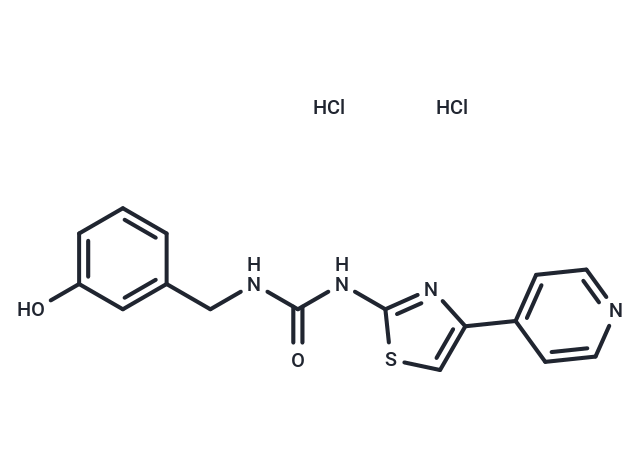Shopping Cart
- Remove All
 Your shopping cart is currently empty
Your shopping cart is currently empty

RKI 1447 dihydrochloride is an effective and selective ROCK inhibitor (ROCK1 IC50=14.5 nM, ROCK2 IC50=6.2 nM). RKI 1447 dihydrochloride can inhibit the growth of colorectal cancer cells and promote cell apoptosis.

| Pack Size | Price | Availability | Quantity |
|---|---|---|---|
| 2 mg | $39 | 5 days |
| Description | RKI 1447 dihydrochloride is an effective and selective ROCK inhibitor (ROCK1 IC50=14.5 nM, ROCK2 IC50=6.2 nM). RKI 1447 dihydrochloride can inhibit the growth of colorectal cancer cells and promote cell apoptosis. |
| In vitro | RKI 1447 effectively inhibits the phosphorylation of ROCK substrates MLC-2 and MYPT-1 in human cancer cells, specifically demonstrating no impact on AKT, MEK, and S6 kinase phosphorylation even at high concentrations up to 10 μM. Its potency ranges from 0.003-10 μM in targeting these substrates, highlighting its strong anticancer activity, particularly against colorectal carcinoma (CRC). Notably, at 10-320 μM for 24 hours, RKI 1447 significantly reduces the growth of CRC cell lines HCT-8 and HCT-116, and at 20-80 μM over the same period, it triggers apoptosis in a dose-dependent manner. Experimental results, including decreased cell viability and increased apoptosis in these cell lines, underscore RKI 1447's effective dose-dependent response, with Western Blot analysis also confirming the reduction of P-MLC-2 levels at concentrations starting from 100 nM, without affecting total MLC-2 levels. |
| In vivo | RKI 1447, administered at 200 mg/kg intraperitoneally (i.p.) daily for 14 days, effectively inhibits mammary tumor growth in MMTV/neu transgenic mice, demonstrating an 87% reduction in tumor volume growth compared to the control group. This compound, when given at a dose of 100 mg/kg i.p. once every three days for the same duration, also demonstrates significant antitumor activity against colorectal cancer (CRC) in 5-week-old male BALB/C nude mice, efficiently blocking tumor growth. Importantly, RKI 1447 does not exhibit physiological toxicity in mice, indicating its potential safety and efficacy for in vivo cancer treatment applications. |
| Molecular Weight | 399.29 |
| Formula | C16H16Cl2N4O2S |
| Cas No. | 1782109-09-4 |
| Storage | Powder: -20°C for 3 years | In solvent: -80°C for 1 year | Shipping with blue ice. |

Copyright © 2015-2025 TargetMol Chemicals Inc. All Rights Reserved.